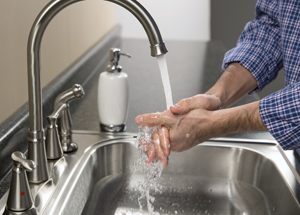Preventing Pneumonia
Pneumonia is an infection in one or both of the lungs. It can be caused by bacteria, viruses, or fungi that fill up the air sacs or alveoli of the lungs with fluid or pus People most at risk include older adults, children under age 2, smokers, and people with chronic lung diseases or a weak immune system. This includes people with asthma, or COPD (chronic obstructive pulmonary disease), such as emphysema or chronic bronchitis. It includes people with HIV/AIDS, or those who are undergoing chemotherapy treatment. There are some things you can do to reduce your risk of pneumonia.

Prevent infection
-
Wash your hands often. To do this:
-
Use soap and clean, running water and scrub your hands for at least 20 seconds. That's as long as it takes to hum the "Happy Birthday" song twice.
-
Lather and scrub the backs of your hands, between your fingers, and under your nails.
-
If soap and water aren't available, use a hand cleaner with at least 60% alcohol in it.
-
Don't touch your face or mouth with your hands.
-
Take care of your teeth and gums every day and see your dentist regularly. Daily oral care and regular dental visits are important to keep your teeth and gums healthy. They also help control your lung disease. Brush your teeth with fluoride toothpaste, clean your dentures, floss, and use an antimicrobial mouth rinse that contains chlorhexidine. If you are in the hospital, you likely will be taught to brush your teeth often to prevent pneumonia. Follow your healthcare team's instructions. Doing these things every day and seeing your dentist can help:
-
Use disposable tissues instead of a handkerchief. Throw used tissues away. Wash your hands after using tissues.
-
Stay away from people who have a cold or the flu.
-
Try to stay away from crowded places, or wear a mask when in public places
-
Tell your healthcare provider if you have trouble swallowing or cough a lot after eating. They can tell you if you should change what and how you eat and drink. This can stop food and drinks from getting into your lungs and causing an infection.
Get vaccinated
Ask your healthcare provider what vaccines you need. There are now 2 different pneumonia vaccines. Both of these are needed if you have a chronic disease or are at higher risk of pneumonia.
Get a flu shot every year as soon as it's available in your area. The flu shot helps prevent you from getting the flu and complications of the flu, such as pneumonia.
Do breathing exercises
Deep breathing and coughing exercises can help clear your lungs. Your healthcare provider may suggest them. If so, you will be shown how to do them. Do them as often as your provider instructs.
Take care of your body
-
Drink at least 6 to 8 glasses of water a day.
-
Eat well-balanced, healthy meals.
-
Brush and floss your teeth every day. It's also important to brush your teeth and floss at bedtime.
-
Call your dentist right away if you have problems with your teeth or gums.
-
Don't drink alcohol.
-
Don’t smoke and don't let people smoke in your home. Stay away from places where people are smoking. Ask your healthcare provider for resources to quit smoking.
-
Move around to keep your lungs clear. Ask your healthcare provider what type of activity is best for you. Walking is often a good choice.
-
Get enough rest. Sleep at least 8 hours each night. Rest or nap during the day as needed.
-
Ask your healthcare provider when you should schedule follow-up care to make sure any infection is gone.
© 2000-2025 The StayWell Company, LLC. All rights reserved. This information is not intended as a substitute for professional medical care. Always follow your healthcare professional's instructions.